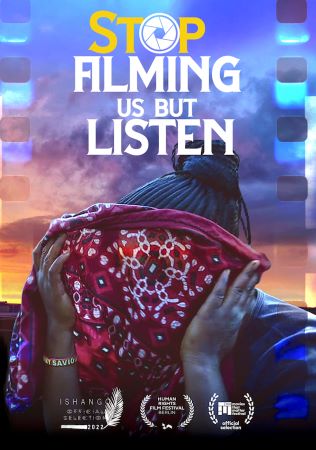
Stop Filming Us But Listen 2022
Distributed by The Video Project, 145 - 9th St., Suite 230, San Francisco, CA 94103; 800-475-2638
Produced by Ganza Buroko
Directed by Bernadette Vivuya and Kagoma Twahirwa
Streaming, 71 mins
College
Documentaries; Filmmaking; Postcolonialism
Date Entered: 06/09/2023
Reviewed by Jodi Hoover, Digital Resources Manager, Enoch Pratt Free Library, Baltimore, MDStop Filming Us But Listen is a powerful response to Western bias in filmmaking. In Goma, Democratic Republic of Congo (DRC) during a screening of his film Stop Filming Us, director Joris Postema was challenged by the audience who felt the film was not authentic. They suggested that the film be given to local filmmakers to create a film using the same footage that would speak more directly to their own lived experience. Bernadette Vivuya and Kagoma Twahirwa used Postema’s film as a starting point to challenge the history of colonialism and the suppression of local voices. The resulting film, Stop Filming Us But Listen, explores the inherent misconceptions present in media produced and funded by non-African creators.
Stop Filming Us But Listen intersperses conversations with filmmakers, film historians, scholars and other community members to create a fuller picture of life in Goma. Footage from early Belgian propaganda films show the Congo’s colonial past and give context for discussions on historical and current appropriation of resources by Western entities. Local filmmakers talk about the difficulty of securing funding for projects that do not fit a specific narrative of “Africa”, often a narrative of poverty and misery. Stop Filming Us But Listen, seeks to expose and address the power discrepancies within the documentary filmmaking process so that we, as viewers, pay attention both to what we see and what is missing.
The film adds important context for any conversation regarding colonialism, implicit bias and representation as well as documentary film history. By weaving informal conversations with more formal interviews, the film remains engaging and thought provoking. In particular, the interviews with the filmmakers themselves are incredibly powerful as they talk frankly about the difficulties they face as creators and the pressure to make their content palatable for Western funders and viewers.
With a runtime of 71 minutes, Stop Filming Us But Listen is ideal for high school or college classroom use. The content is versatile and could be used to augment courses related to global studies, history, gender studies, ethnic studies and more. It would also be a good fit for collections with a focus on film history and documentary film history.
Awards:Official Movies That Matter Festival and Human Rights Film Festival Berlin
Published and licensed under the Creative Commons Attribution 4.0 license. Anyone can use these reviews, so long as they comply with the terms of the license.